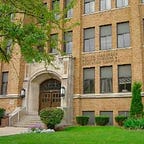Clinical Assets
By Ann Christenson
The L-shaped, light-filled room is stocked with equipment — an anti-gravity treadmill, an elliptical machine, free weights, exercise balls, high and low tables — but only a few patients. It’s the end-of-semester lull for the Marquette Sports Rehabilitation Clinic.
Normally, says clinic director Jeff Wilkens, PT ’99, there wouldn’t be a piece of unoccupied equipment in the place.
Located on the second floor of Cramer Hall, the four-year-old clinic is a quiet campus success story. There’s no signage outside the building, and patients mostly come by “word of mouth,” says Wilkens, who estimates that 90–95 percent of patients are students, faculty, employees and the families of Marquette employees.
But the facility is open to anyone and accepts all forms of insurance except Medicare/Medicaid. Services offered range from full physical therapy and athletic training to X-rays, bone density scans and free injury evaluations.
“It’s a huge benefit to employees, most notably that the time to get an appointment is significantly reduced,” says Wilkens, who treats patients in addition to running the clinic.
It’s staffed by three licensed physical therapists, including Wilkens, and one part-time physical therapist. Marquette PT students are huge contributors to the clinic’s day-to-day operations. Each semester, about a dozen undergrads work four to five hours per week as PT aides or technicians. They perform ultrasound treatments and assist with basic tasks under the direct supervision of a physical therapist. Learning from a professional in a clinical environment is only one of the advantages for students.
They “get the experience of interacting with patients,” says Wilkens. “Sometimes the hardest thing is to be with someone and talk.”
It’s not unusual for a student to work at the clinic for more than a semester. Kim Alkock, a fifth-year student in the six-year doctor of physical therapy program, says the clinic is a perfect opportunity to “see and learn a lot from physical therapists who know their stuff.”
Alkock also works at the clinic’s pro bono offshoot: the Community PT Clinic, which operates in the same space. This PT student-run clinic serves people in the surrounding community who don’t have private health insurance. The hours are determined by the students’ semester schedules.
Because the students aren’t licensed PTs, they’re supervised by Marquette clinicians such as Wilkens, who also serves as faculty adviser.
Spanish skills of students such as Alkock are important at the clinic, which receives referrals from medical clinics, including from those on Milwaukee’s near south side Hispanic community. Case in point: She was able to help a patient who hadn’t been compliant with her treatment goal in the past because of problems communicating with the PT staff.
“It showed us how important communication is in establishing a relationship with a patient,” she says.
A Powerful Learning Experience Jacqueline Podewils oversees operations at the Marquette University Speech and Hearing Clinic, a year-round service to the local community, that treats children as young as 2 years old up to older adults.
The space in Cramer Hall includes numerous therapy and language rooms where graduate students in speech-language pathology help deliver clinical services while being closely supervised by staff from the Department of Speech Pathology and Audiology.
“We do a lot of work with kids with autism, kids with sensory problems and adults with aphasia,” says Podewils, director of clinical services for the Department of Speech Pathology and Audiology. The state-of-the-art facility is a first-rate training ground for students. “Our clinic exists to be a working lab,” Podewils adds, explaining the extensive array of diagnostic equipment used to prepare students for their careers.
Graduate students in speech-language pathology spend their first year fulfilling clinical requirements. Second-year students spend their fall and spring semesters doing a school practicum in the medical community and in public schools.
Podewils shows off a therapy room for children, equipped with an observation space so parents and a student supervisor can observe the student’s interaction with the child. Some of the rooms on the clinic’s first floor have props — bean bags and kitchen play sets — to help children respond in a more natural setting.
One of the clinic’s larger labs is the Adult Language Room. Here, clinicians offer therapy to patients with aphasia, a language disorder caused by damage to the brain. It’s a warm, welcoming gathering place with comfortable seating and tools to help stimulate communication.
Graduate student Nikki Demmers worked with adults in the clinic’s Aphasia Group whose 10–12 members were asked to read the book Unbroken.
“It was powerful,” she says. “There were several people who had experienced war personally or had heard of the experiences of a parent, so we had a lot of discussion and sharing of stories. This is a great way to make progress in a rehabiltative aphasia program.”
To Demmers, the therapy sessions make classroom time even more valuable. “It’s exciting to learn about a technique or an approach and get to try it with a client the very next day,” she says.
“Though the clinic models are quite different, both the sports rehabilitation clinic and speech and hearing clinic are doing important work for the community at large, the Marquette community and of course for our students in training,” says Dr. William Cullinan, dean of the College of Health Sciences. “After a life- altering injury or illness, it is often the case that professionals from the disciplines of speech pathology and physical therapy become the most important people in your life. We keep that in mind as we develop their training experiences, and the clinics are a great help.”
